Content from the Brookings Doha Center is now archived. In September 2021, after 14 years of impactful partnership, Brookings and the Brookings Doha Center announced that they were ending their affiliation. The Brookings Doha Center is now the Middle East Council on Global Affairs, a separate public policy institution based in Qatar.
A decade after the overthrow of longtime dictator Moammar Gadhafi, Libya is set to hold elections this December to produce a unified government. As the date approaches, the country’s Maghreb neighbors — Tunisia, Algeria, and Morocco — are showing intensified interest in its ongoing peace process.
Algerian decisionmakers resumed Libya flights, opened a sea line between Algiers and Tripoli, and recently appointed Ramtane Lamamra — who has been highly engaged in the Libya dossier — as foreign minister. Tunisia remains most interested in controlling security risks and reestablishing economic ties and has signed agreements with Libya over the summer to promote mutual trade, investment, and movement of travelers. Morocco, the birthplace of the 2015 Skhirat agreement (which recognized the Government of National Unity as Libya’s sole legitimate authority), is organizing meetings between rival Libyan actors and bilateral talks with officials on potential cooperation in the fields of enhanced security, trade, and renewable energy.
Despite a problematic lack of coordination on the Libya dossier between these states, all putatively agree that elections are the best way forward for the conflict-stricken country. Furthermore, they have all consistently supported inter-Libyan dialogue that promotes Libya voices. Yet their heightened interest over recent months raises questions. Why have they become increasingly invested in Libya, and what do they stand to gain from its stability?
Security
The primary reason behind Maghreb interest in Libya’s stability is the security threat which continued chaos represents. As political instability piqued in Libya following 2011, it led to increased terrorism, organized crime, weapons proliferation, and drug trafficking. This is especially problematic for Algeria and Tunisia, which share porous land borders with Libya. The Tunisian government has significantly increased security spending since the collapse of the Libyan security sector, while the Algerian regime increased the number of troops along its shared border. Even Morocco, which is not a direct neighbor, has been impacted by instability in Libya, particularly in terms of the threat of terrorism. As Moroccan fighters joined the Islamic State group’s branch in Libya — from where the terrorist organization planned to launch attacks on Europe — their imminent return created risks for the kingdom’s security.
Furthermore, because of the power vacuum in Tripoli, the possibility of terrorist organizations and rebel groups launching their offensives from Libya was a real threat for the entire North Africa region, as evidenced when a Chadian military-political rebel group launched a battle that killed President Idris Déby Itno. The collapse of Libya’s security sector has also made it possible for weapons smuggling, drug trafficking, and other criminal activity to take place at an intensified level. While prior to 2011 Libya saw little trafficking in drugs other than cannabis, it is now a well-established route for cocaine, heroin, and amphetamines.
This could explain why certain Maghreb states have signaled the possibility of military partnership with Libya’s Government of National Unity. The president of Algeria, a historically isolationist country, claimed that he was ready to “enforce red lines” against Field Marshal Khalifa Hifter. Furthermore, a 2020 reform of the country’s constitution made it possible for the Algerian army to deploy overseas, a change from a decades-old non-interventionist military policy. Morocco and Libya meanwhile are in advanced talks on enhanced cooperation on terrorism and migration and aim to enter into a military partnership. It is true that the aforementioned Algerian constitutional reform is likely also due to the rising instability in the Sahel region and that the Morocco talks are possibly another way for the kingdom to maintain its involvement in the Libya dossier and promote its interests. However, these developments suggest that the two countries are taking steps to ensure they would be able to protect themselves from a security threat emanating from Libya or to intervene to deescalate such a situation.
Economy
Tunisia is perhaps the Maghreb state that stands to gain the most from reinstating strong economic ties with Libya. Since 2011, its economy has been impacted by emigration of Libyans to Tunisia as well as the return of Tunisian workers from the country. The security threat also contributed to reduced tourism and investment as well as increased security spending. The World Bank estimated that, between 2011 and 2015, the Libyan crisis reduced Tunisia’s growth by 24%.
Stability in Libya would gradually reverse these effects and would open the door for bilateral economic cooperation. Increased tourism and trade would boost Tunisia’s fragile and COVID-19-hit economy. The recently opened borders have already allowed Tunisian merchants in impoverished areas to travel to Libya and sell their merchandise. Both sides aim to boost cooperation in trade, investment, and tourism down the line as was seen during a Libyan-Tunisian economic forum held in Libya last May.
Morocco, which did not enjoy strong economic ties with Libya under the Gadhafi regime, could also benefit from new trade and energy deals. Moroccan decisionmakers are working towards this. The kingdom’s foreign minister announced in June the organization of a second bilateral economic forum. That same month, Libya’s minister of oil and gas discussed ongoing talks about renewable energy cooperation with Morocco.
To a lesser extent, Algerian officials have also recently shown that they are open to improving trade with Libya and reopening the shard land border which could turn into a major economic zone. Like Tunisia and Morocco, Algeria also organized an economic forum with Libya and signed an agreement on trade exchange and industrial forums. Algiers has also provided economic assistance to communities in southwest Libya, including food aid in 2014 during the tribal conflict between the Tebu and Tuareg tribes.
A potential benefit from peace in Libya on the regional level could be bolstered intra-regional economic integration in the Maghreb. Trade between Maghreb states stood at 2.8% in 2019, compared to 10.7% between the members of the Gulf Cooperation Council. Reasons include the crisis in Libya as well as logistical constraints and tensions between Algeria and Morocco. Peace in Libya could present a small possibility for improvement and could make it possible for these states to consolidate economic integration and start initiatives for cross-border security cooperation.
Regional competition
Beyond their domestic interests, some Maghreb states are invested in the Libyan peace process in and of itself to bolster their position on the regional and international stages. Since hosting the meetings which resulted in the signing of the Skhirat agreement, Morocco has organized multiple talks on the issue of key institutional positions, as recently as this summer. Moroccan decisionmakers attach great importance to the kingdom’s role in the Libyan peace process, which Rabat views as a way to bolster its international reputation as a credible mediator. This could explain why Moroccan officials were slighted by their exclusion from the 2018 Berlin Conference (to which Algeria and Tunisia were eventually invited) and why the kingdom was subsequently relatively absent on the Libya dossier between 2018 and 2020.
By intensifying its involvement in Libya, Morocco also seeks to check rival Algeria’s influence in the region. As Algeria recently came to agreements with Tunisia, Egypt, and Turkey on the crisis in Tripoli — suggesting intensified interest in Algiers on the dossier — Morocco may come to fear that its influence on Libya and the region may diminish. This would in turn exacerbate its tensions with Algeria and push it to become even more involved in Libya.
Outlook: After peace?
Libya’s peace process will remain a complicated one. Even if elections take place this December, the vote goes smoothly, and it results in a unified government which Hifter does not contest, the road ahead will still be long. It may take years for Libya’s neighbors to reap economic and security benefits.
Yet, in this scenario, the regional security threat would diminish in the near future which would ease pressure across the board. The Tunisian government could reduce security spending, while Algeria and Morocco could refocus their security efforts on the Sahel region. Foreign investment in the Maghreb would also eventually pick up in the medium to long term, as could tourism (depending on the epidemiological situation).
In the meantime, Maghreb countries will continue to pursue their individual interests through their ties with Libya. The government in Tunisia will likely seek to sign further agreements relating to commerce and tourism while keeping its eye on potential energy deals down the line. Algeria will remain most concerned with the potential security threat that could come out of Libya should the peace process fail, though it is unlikely to intervene militarily beyond securing their shared border. Morocco will aim to assert its role as mediator while preserving the Skhirat institutions. To this end, it will most likely hold more Bouznika-style meetings between rival actors. However, a unified Maghreb response to the Libyan crisis is highly unlikely as long as tensions and ideological differences persist.
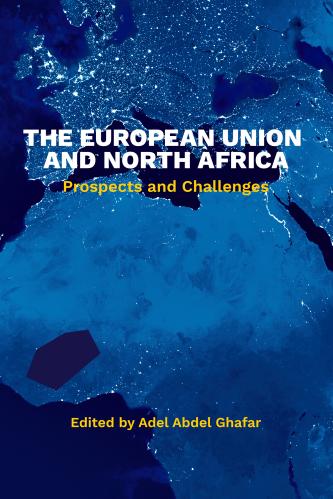
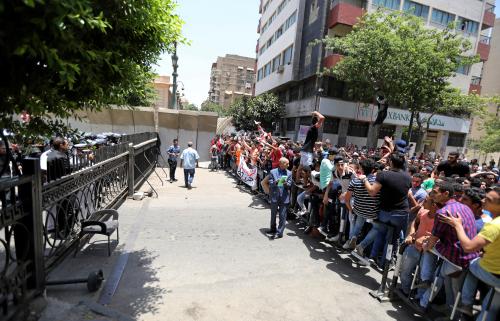
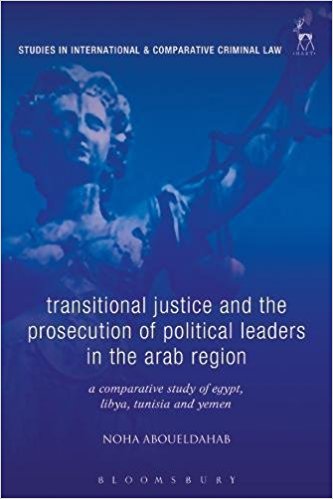
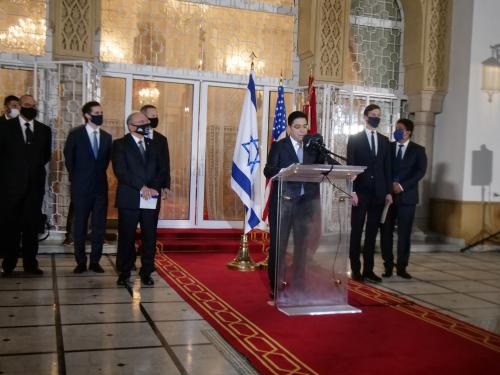
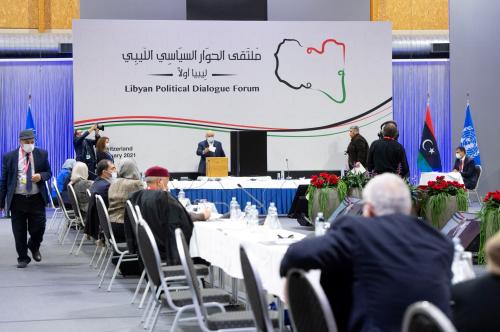
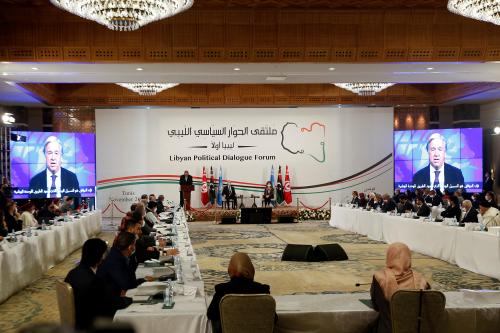




Commentary
Libya’s peace process: What’s at stake for the Maghreb, 10 years after Gadhafi’s overthrow
August 19, 2021